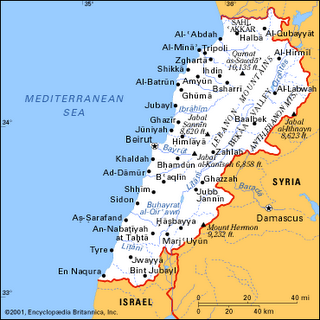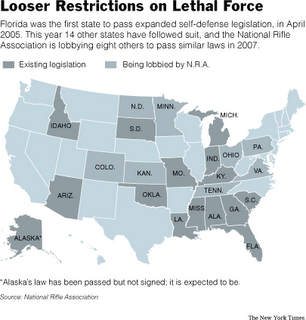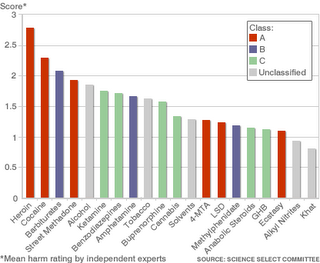Amnesty International Accuses Israel of War Crimes in Lebanon
August 24, 2006
Human Rights Group Accuses Israel of War Crimes
By JOHN KIFNER
BEIRUT, Lebanon, Aug. 23 —
Amnesty International accused Israel on Wednesday of war crimes in its monthlong battle with Hezbollah, saying its bombing campaign amounted to indiscriminate attacks on Lebanon’s civilian infrastructure and population.
“Many of the violations examined in this report are war crimes that give rise to individual criminal responsibility,” Amnesty International, the London-based human rights group, said in a report on the Israeli campaign. “They include directly attacking civilian objects and carrying out indiscriminate or disproportionate attacks.”
“During more than four weeks of ground and aerial bombardment by the Israeli armed forces, the country’s infrastructure suffered destruction on a catastrophic scale,” the report said, contending this was “an integral part of the military strategy.”
“Israeli forces pounded buildings into the ground,” the report went on, “reducing entire neighborhoods to rubble and turning villages and towns into ghost towns as their inhabitants fled the bombardments.
“Main roads, bridges and petrol stations were blown to bits. Entire families were killed in airstrikes on their homes or in their vehicles while fleeing the aerial assaults on their villages. Scores lay buried beneath the rubble of their houses for weeks, as the Red Cross and other rescue workers were prevented from accessing the areas by continuing Israeli strikes.”
Mark Regev, the spokesman for Israel’s Foreign Ministry, categorically rejected the claim that Israel had “acted outside international norms or international legality concerning the rules of war.” Unlike Hezbollah, he said, Israel did not target the civilian population, nor did it indiscriminately target Lebanese civilian infrastructure.
He added: “Our job was made very difficult by the fact that Hezbollah adopted a deliberate policy of positioning itself inside civilian areas and breaking the first fundamental distinction under the rules of war, by deliberately endangering civilians. Under the rules of war, you are legally entitled to target infrastructure that your enemy is exploiting for its military campaign.”
Citing a variety of sources, the Amnesty International report said Israel’s air force had carried out more than 7,000 air attacks, while the navy had fired 2,500 shells. The human toll, according to Lebanese government statistics, was estimated at 1,183 deaths, mostly civilians, about a third of them children; 4,054 wounded; and 970,000 people displaced, out of a population of a little under four million.
“Statements from the Israeli military officials seem to confirm that the destruction of the infrastructure was indeed a goal of the military campaign,” the report said. It said that “in village after village the pattern was similar: the streets, especially main streets, were scarred with artillery craters along their length. In some cases, cluster bomb impacts were identified.”
“Houses were singled out for precision-guided missile attacks and were destroyed, totally or partially, as a result,” the report said. “Business premises such as supermarkets or food stores and auto service stations and petrol stations were targeted.
“With the electricity cut off and food and other supplies not coming into the villages, the destruction of supermarkets and petrol stations played a crucial role in forcing local residents to leave.”
The Amnesty International report said the widespread destruction of apartments, houses, electricity and water services, roads, bridges, factories and ports, in addition to several statements by Israeli officials, suggested a policy of punishing the Lebanese government and the civilian population in an effort to get them to turn against Hezbollah.
“The evidence strongly suggests that the extensive destruction of public works, power systems, civilian homes and industry was a deliberate and integral part of the military strategy rather than collateral damage,” the report said.
It also noted a statement from the Israeli military chief of staff, Lt. Gen Dan Halutz, calling Hezbollah a “cancer” that Lebanon must get rid of “because if they don’t, their country will pay a very high price.”
The Amnesty International report came as a number of international aid and human rights agencies used the current lull in fighting to assess the damage.
The United Nations Development Program said the attacks had obliterated most of the progress Lebanon had made in recovering from the devastation of the civil war years. “Fifteen years of work have been wiped out in a month,” Jean Fabre, a spokesman for the organization in Geneva, told reporters.
Another urgent issue, aid groups say, is the number of unexploded bomblets from cluster bombs littering the southern villages. Tekimiti Gilbert, the operations chief of a United Nations mine removal team, told reporters in Tyre: “Up to now there are at least 170 cluster bomb strikes in south Lebanon. It’s a huge problem. There are obvious dangers with people, children, cars. People are tripping over these things.”
United Nations officials say at least five children have been killed by picking up the bomblets scattered about by the cluster bombs.
Despite the cease-fire, southern Lebanon remained tense on Wednesday. Three Lebanese soldiers were killed trying to defuse a rocket that had not exploded. An Israeli soldier was killed and two others wounded when, according to the Israeli military, they walked over a minefield that Israel had previously buried.
The Israeli military also said it had fired artillery rounds from the disputed territory of Shabaa Farms to the Lebanese village of Shabaa. There were no reports of casualties.
Greg Myre contributed reporting from Jerusalem for this article.
Visit http://www.amnesty.org/for access to the entire report.
--JB











